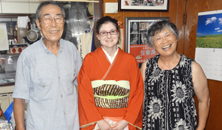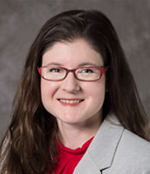
Professor Lauren Zarzar, PhD
Pennsylvania State University
(JSPS Summer Postdoctoral Fellowship: University of Tokyo, 2013)
Lauren Zarzar is an Assistant Professor of Materials Science and Engineering and Chemistry at Pennsylvania State University. Prior to her appointment at Penn State, she was a postdoctoral associate at MIT from 2013 to 2016, where she developed complex multiphase emulsions that are dynamically reconfigurable and responsive to external stimuli. She received a PhD in Chemistry and Chemical Biology from Harvard University in 2013. Before graduating from Harvard, she spent the summer of 2013 at the University of Tokyo on a JSPS fellowship, researching confinement effects on stimuli-responsive liquid crystals. From 2004 to 2008, she attended the University of Pennsylvania, where she earned dual bachelor’s degrees in Chemistry and Economics.
|
Q: What motivated you to apply to the JSPS fellowship program? How did you find out about it?
When I applied to the fellowship, I was a graduate student at Harvard University, and near the end of my PhD I saw an advertisement for the program. It sounded really exciting to me, since my PhD research was about responsive and active materials, and there are quite a few scholars in Japan that work on this. It just seemed like a really great opportunity to not only get to work with some people whose work I had been following for a number of years, but also a good cultural opportunity for me. I had never been to Japan before, so that was why I took it upon myself to apply.
Q: How did you find your host professor, and what sort of work did you do with them?
MMy host researcher was Professor Takashi Kato at the University of Tokyo. He’s one of the world leaders in stimuli-responsive liquid crystal materials. In graduate school, I had been working with micro-patterned confining surfaces, and I was interested to see how his materials would behave with them. So I saw this opportunity to combine our areas of interest. These materials that Professor Kato’s group works with have to be synthesized by researchers, and I didn’t have the capabilities to make them myself. By going there, I was able to use and study these materials that I wouldn’t have access to otherwise.
Q: What kind of experiences did you have while doing research in Japan? Was there anything that was particularly satisfying or challenging?
It was definitely culturally very different. That was probably one of the most interesting things that I got out of it, this cultural experience of seeing what it’s like to do research there. The structure in the research lab was a lot more hierarchal. And additionally, I don’t know Japanese, so the language was a little bit of an issue in the lab. All of the students could read English very well, but sometimes I had to speak slowly or rephrase things to make sure that people understood me. But if we ever had a problem with communicating, there was always somebody that could help translate and figure out what we were talking about. So the language barrier slowed things down a little bit, but it certainly didn’t prevent us from getting work done.

Professor Zarzar and her host family in Tokyo

Trying on a kimono (traditional Japanese clothing) with her host parents

Making Japanese food with her host mother
Q: How about your life outside of the lab? Did you have any concerns about going in a foreign country?
I was a little apprehensive at first having never spent such a long time living abroad. But I really like traveling, and I like doing new things, so I was excited about it. And Japan was one of those places that I had always wanted to visit. In terms of the logistics and the planning, I felt like there was a lot of support. I got help with housing from the university, and it was all taken care of for me, so I don’t remember anything particularly being a challenge. Since I enrolled in the Summer Program, I was placed with a local host family for a few days during orientation, before the program began. I’ve kept in touch with them and they’ve come to visit the US multiple times since then. My family exchanges cards with them every year.
In terms of my life outside the lab, I loved trying all the different foods. I love sushi, so I went to the fish market frequently. Every weekend, I would try to go somewhere new: shopping, or just walking around. There was certainly an element of homesickness after a while. For example, I remember just really wanting peanut butter, and other things that I would eat in the US all the time but that were challenging to find in the local grocery stores. But you find the new foods that you’re excited about, and you try new things. I really enjoyed myself.
Q: How do you feel your experiences in Japan impacted your career afterwards?
I’ve kept in contact with my host researcher, and we’ve discussed the possibility of sending his students here to my lab in the future. Who knows, we might end up having a new collaboration together some day! I also think that the cultural awareness, particularly the understanding of research group dynamics and how those vary, is important. During my graduate and post-graduate training, there were a number of Japanese postdocs in the labs that I worked in, and I think my experiences gave me a new understanding of where they come in terms of their background and how they do research. So it gave me a different perspective, and I’m sure that’ll be helpful in my role now as the leader of a research group, in the sense of understanding how to manage people and how to motivate them, and where they come from in terms of their cultural backgrounds.
When I was interviewing for jobs and people noticed that I had done research in Japan, oftentimes, they would ask about it, because it’s different. Most US graduate researchers don’t get that opportunity. The fellowship also looks good on my resume, in that I wrote this proposal as a graduate student and was able to get funding to actually pursue my ideas.
Q: Do you have any advice for prospective applicants?
You can go anywhere in the US and do a collaboration, but immersing yourself in the research culture of another country is an entirely different experience. And I think that was the biggest impact for me. Certainly scientifically, I learned a lot, but even bigger than that was the cultural experience of the research. I think you just have to be excited to do it. |













